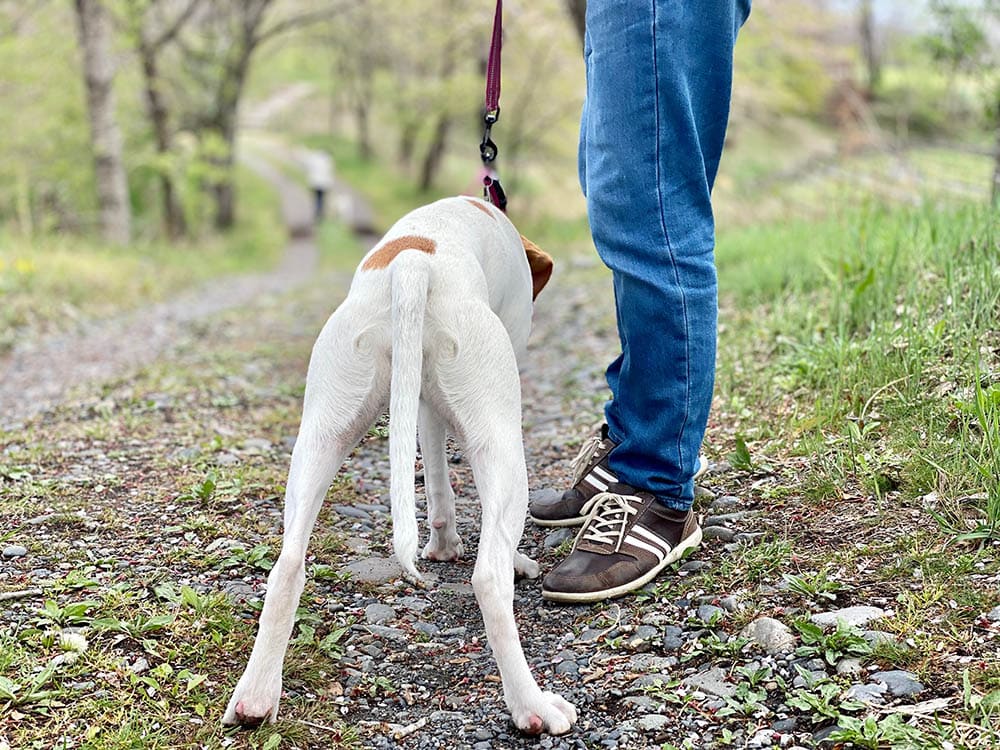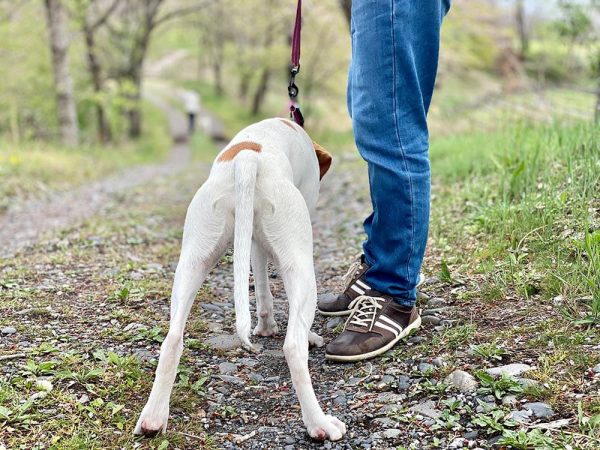If there’s one thing worse than being peed on, it’s being peed on by your best friend—your canine friend, of course! (Geez, what kind of friends do you hang out with?)
Dogs are great pets known for their loving companionship and intelligent intuition when it comes to basic training. Housetraining is straightforward for most dogs, as they instinctively want to pee outside or at least in a select spot.
So, the last thing that you expect is your dog peeing on you in your own home! However, you should know that your pet isn’t trying to be rude, and there is a legitimate reason for this occurrence.

The 5 Reasons Why Your Dog Is Peeing on You
1. Submissive Urination
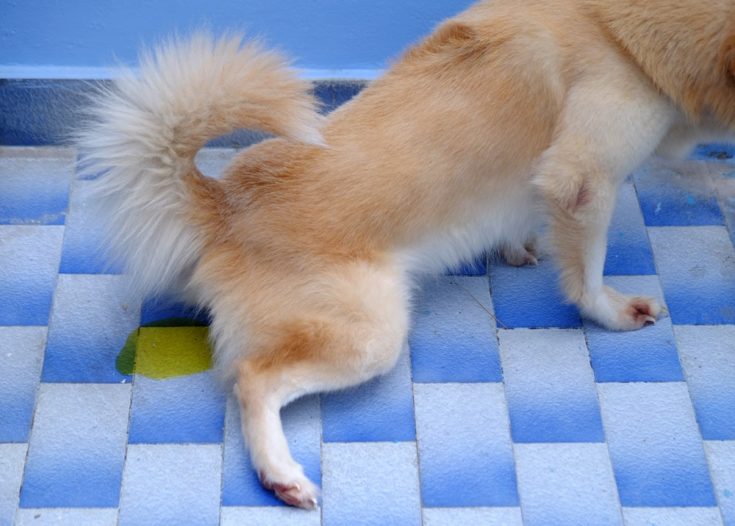
Submissive urination is common in dogs when they feel threatened.1 It is based on a fear/anxiety response, and you’ll commonly see it when you approach or reach for your dog.
This behavior is most common in young dogs. They are still learning how to interact and socialize at these developmental stages. They will mostly approach people and other dogs with submission to show they are not a threat. Puppies often outgrow this behavior.
Submission is not limited to just puppies; many adult and elderly dogs will display submission but will have better control over their urination during submissive displays. Adult dogs that still urinate in submission may have difficulty regulating their anxiety or were abused in the past.
You can identify submission urination if it’s coupled with other submissive body language.
- Low stance
- Tucked back ears
- Licking
- Raising paws
- Rolling over
- Don’t scold them or get angry. This response will be interpreted as dominance and may worsen the submission urination.
- Retain friendly body language and a calm tone.
- Use positive reinforcement with your interactions, such as training, treats, and pets. It will boost their confidence and strengthen your bond.
- Don’t ignore them. Refusing to acknowledge their submission to you will just confuse them. Instead, engage positively, so they recognize that they are safe with you.
2. Urinary Incontinence
Your dog may pee on you simply because they are unable to hold it in, and they may not even realize they are peeing. Urinary incontinence in dogs can be caused by neurological disorders, spinal/nerve injuries, disease, UTIs, and age.2 Elderly dogs can often lose muscle mass around their bladder, making it more difficult for them to control their bladder function.
- Dripping urine
- Excessive genital licking
- Urethra redness or swelling
- Frequent urination
- Struggling or visible pain while urinating
- Blood in urine
- Excess water consumption
- Urine dripping
- See a vet! If you suspect any urinary issues with your dog, your first port of call should always be your vet. They can identify any serious problems, and treatment is available for many infections.
- If prescribed by the vet, use bladder supplements or specialized urinary diets to support a healthy balance in your dog’s urinary and kidney systems.
- For elderly incontinence, you may not be able to eliminate the problem. Instead, you should focus on management.
- Consider doggy diapers.
- Use puppy training pads around the home.
- Do regular bathroom breaks.
- Give regular baths to prevent skin infection.
- Get waterproof bedding.
3. Marking Their Territory
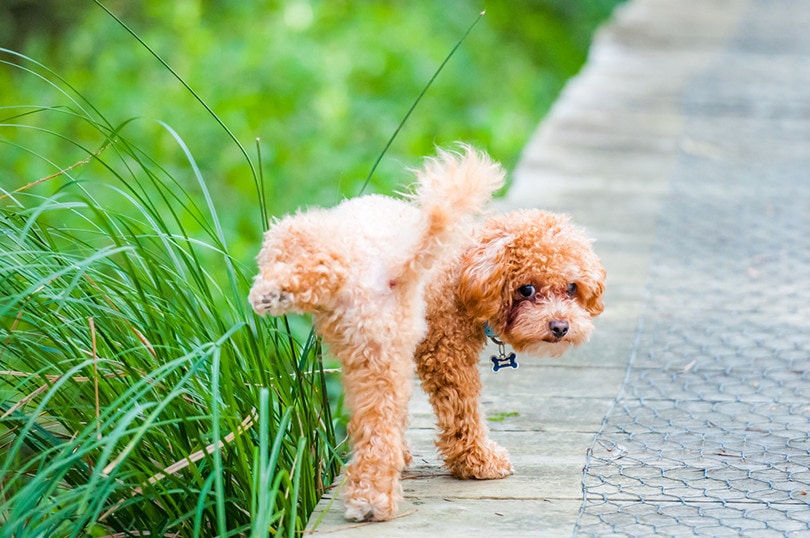
Unlike us humans, dogs lack a comprehensive language to communicate with each other. In addition to body language, dogs will use chemical signals to leave messages for each other. They do this in the form of urine marking. You may typically see your dog engage in this behavior outdoors, especially when encountering unfamiliar scents on their walks. This marking leaves a message to other dogs that your dog has claimed an item or territory as their own.
If your dog is peeing on you, they may be marking you as their property! This behavior usually does not happen unprompted. Your dog may mark you if something around them makes them feel uneasy or anxious, such as unfamiliar dogs, people, or items. They may even feel nervous about an unknown human or canine smell on you when you return home.
- Aggressively territorial of the home
- Showing sexual behaviors
- Conflict with other dogs
- Desex your dog, especially if they’re male. Neutering can reduce marking behavior in boy dogs by 40%.
- Desex other animals in your household. The hormones of other animals around your dog may trigger a hormonal response, despite being desexed themselves.
- Socialize well and early. If your dog is well-socialized, they are less likely to feel threatened by the presence of other visiting dogs.
- Introduce new pets to your dog gradually to avoid them feeling threatened.
4. Poorly House Trained
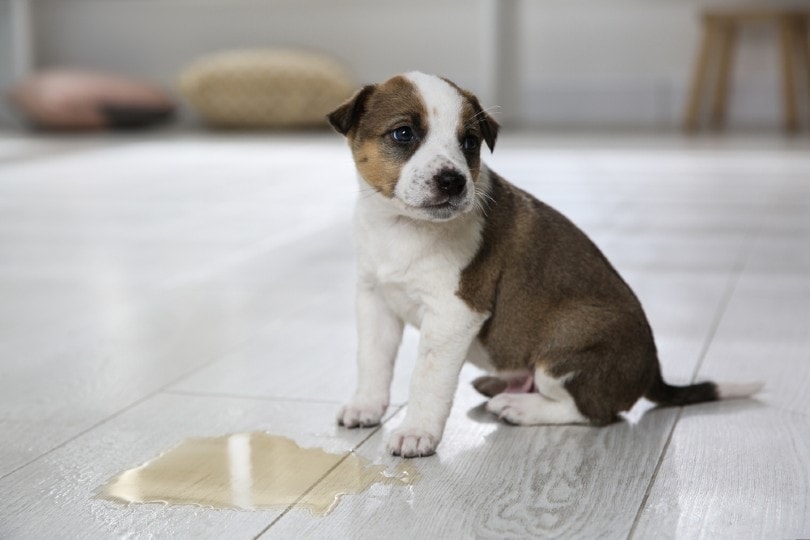
Unwanted urination in the home—and on you—may just be attributed to a dog not yet being housetrained. This could be likely if your dog is new to the household, whether they’re a young puppy or an older adopted dog.
New additions don’t know the rules of the home, where to go to the bathroom, or how to signal they need to go outside.
- Releasing bladder and bowel around the home
- Looking for places to go to the toilet
- Take your dog outside regularly, preferably to a grass area, especially just after waking up. For puppies, they will need lots of outside visits.
- Don’t talk to them when they are supposed to be toileting. This can distract them from the reason that they are outside.
- When they toilet outside, offer them a lot of praise and positive reinforcement.
- Don’t scold indoor accidents. This will cause fear and anxiety.
- Utilize “puppy pads” for training if your dog will be inside for long periods.
5. Emotion Overload: Fear, Anxiety, or Excitement
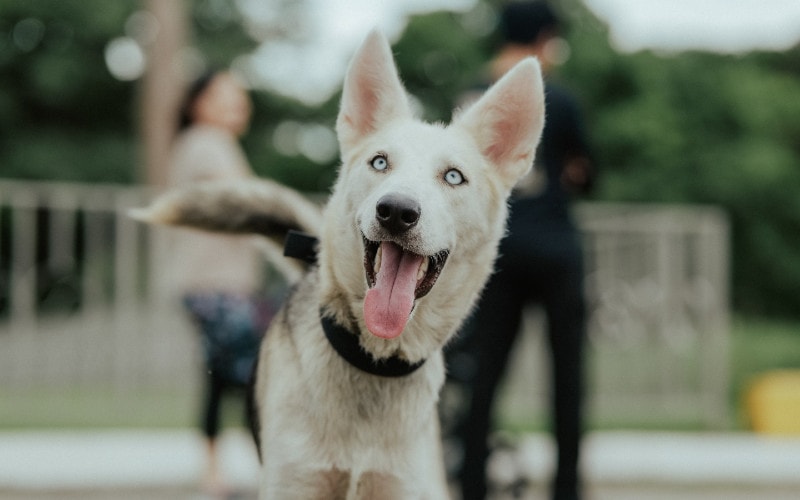
When dogs experience powerful emotions, their nervous system can engage the sympathetic system. This shuts down other unnecessary functions (like the bladder) to fuel heart rate and muscle movement.
This biological response can’t be controlled by your dog, and it can be in response to a range of emotions, typically excitement, fear, or anxiety. Excitement is most common in young dogs, and they often grow out of this kind of urination.
Dogs that are extremely fearful or anxious may also lose bladder control when faced with these confronting emotions.
- Tail wagging
- Whining
- Jumping
- Licking
- Cowering
- Whimpering
- Shaking
- Hiding
- Create quiet, safe spaces in the home for your dog. This way, when they feel overwhelmed with fear or excitement, they have a place to calm down.
- Eliminate the source. If your dog is scared of loud TV noises, turn it down. If they go bananas over a tennis ball, restrict them to playing with it outside.
- Calming supplements can benefit both hyperactive dogs and those that experience anxiety.
- Engaging in training with your dog can help build their confidence. It will also set a standard of behavior for them to follow and help settle overly emotional dogs.
In Conclusion
Obviously, being peed on is not pleasant. Still, the most important thing is that you do not scold or hit your dog if this unfortunate event occurs. While it might seem that way, they are not trying to be a jerk. There is always a reason for out-of-character behavior in your dog.
In this instance, there are many potential causes. Make sure you observe your dog’s behavior closely to ensure that you come to the right conclusion. Your vet can assist in ruling out medical reasons and discussing behavioral issues.
See also:
- Why Does My Dog Pee on My Child’s Bed?
- Why Does My Puppy Pee So Much?
- Why Does My Dog Pee When I Pet Them?
Featured Image Credit: candy candy, Shutterstock

